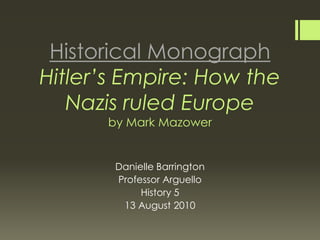
Historical monograph
- 1. Historical MonographHitler’s Empire: How the Nazis ruled Europeby Mark Mazower Danielle Barrington Professor Arguello History 5 13 August 2010
- 2. A General Uncertainty Prior to reading this historical monograph, I had the impression of Hitler as a leader with his end goal in sight from the very beginning. However, this book showed me that Hitler really had no plans as to the future of his empire; he made decisions only when he absolutely needed to. Even the decision to kill what he believed to be “lower races” of people, such as Jews, came about slowly and in a disorganized state. While Hitler knew that he wanted his perfect empire that would rival that of Rome, he didn’t know how he would achieve it. Murdering millions of people was a solution thrown together somewhat haphazardly.
- 3. The Third Reich Despite this uncertainty, Hitler’s massive military could accomplish virtually anything. The Third Reich, as it came to be known, was an authoritarian overflow. There were army men, SS men, party bosses, civil servants, businessmen, ideologues, institutions, and individuals with power under Hitler’s rule, and they caused quite a bit of rivalry within the Reich. They fought for a racially defined Germany with the help of international collaborators who sided with the Germans mostly because of self-interest. When Germany began losing the war, this support died until there was nobody left to offer help; all those on the extreme side of the Nazis ended up as casualties of the war.
- 4. The Use of Terror All of these different branches of the regime were able to come to such power because of one major force: fear. By exercising extreme brutality and fearlessness with absolutely no hesitation, any resistance that considered standing up to Hitler’s army were immediately silenced out of fear. It is possible that the brutal means of killing those races that Hitler believed were below the status of Aryan races was done as a means of deterring any resistance. It is also probable to say that this worked, as the United States and other countries around the world refused to get involved in the Nazi military’s business despite knowing the severity of the actions.
- 5. The Silver Lining The Nazi regime’s brutality is what eventually forced the rest of the world to get involved and put an end to a horrific rule like that of Hitler. Without such a terrible precedent, it could have been possible for other dictators to gain control and abuse their power in other countries without fear of intervention. The United States was able to play an important role and establish itself as a superpower of the world. As the author writes, “the war was the end of Europe as the maker of norms and world policeman… Henceforth, international order would emerge on a different basis, guided by different hands.” In this sense, the war was necessary because it shows the world the importance of acting justly, rather than avoiding action because of fear.